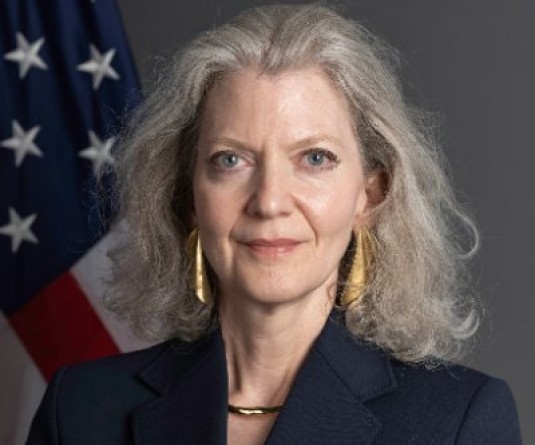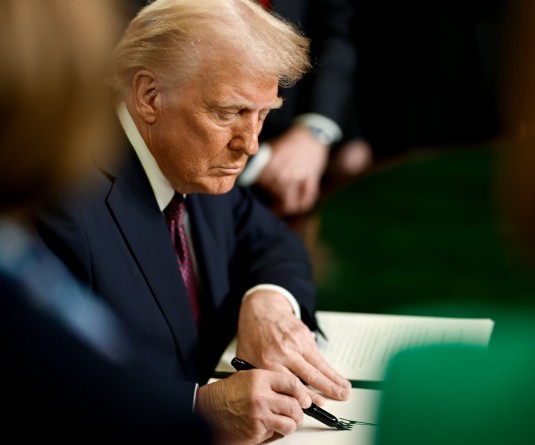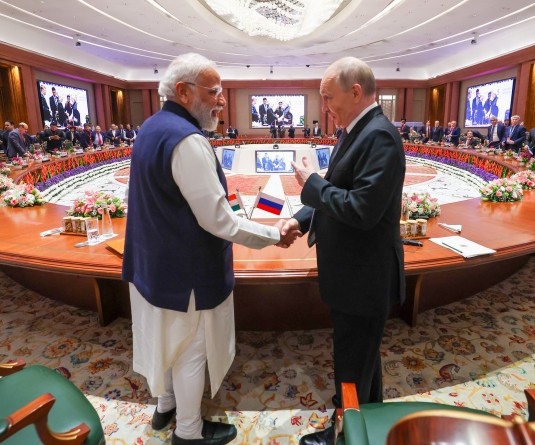
Air crew work on a Royal Air Force Tornado, one of the typres of aircraft to be used in the operation of a no-fly zone over Libya, at the Lossiemouth air base at Moray, Scotland on Friday, March 18. Britain’s Prime Minister David Cameron told parliament that preparations to deploy the aircraft were already under way and they would begin moving out to air bases in the Mediterranean region “in the coming hours”. (AP Photo)
TRIPOLI/UNITED NATIONS, March 18 (Reuters): The United Nations authorized military attacks on Muammar Gaddafi's forces, after his forces closed in on the Libyan rebels and he vowed to storm their stronghold with "no mercy, no pity." French sources said action could follow in hours, and could include France, Britain, possibly the United States and one or more Arab countries. A U.S. official said no immediate U.S. action was expected. Gulf state Qatar said it would take part but it was unclear if that meant military help. People in Misrata said the rebel-held western city was being pounded by Gaddafi's forces on Friday morning.
"There is heavy bombardment there, explosions inside the city," said Tariq, a doctor from Misrata now in Britain, after speaking to colleagues and family by phone. "They cannot deploy any ambulances. They think it's artillery and tanks, shelling, not air strikes."
Gaddafi's son Saif al-Islam said on Friday that Libya was "not afraid" of the U.N. move, Al Arabiya television reported. Time was running short for Benghazi, the eastern city that has been at the heart of Libya's month-old revolt.
But Gaddafi's troops did not fulfill his threat to overrun the rebel base overnight after their rapid counter-offensive brought them to within 100 km (60 miles) of the eastern city. "We will come. House by house, room by room," Gaddafi said in a radio address to Benghazi late on Thursday.
Saif said on Friday the Libyan army would surround but not enter Benghazi and "anti-terror" forces would be sent in to disarm rebel forces, Al Jazeera quoted ABC news as saying.
Al Jazeera television showed thousands of people listening to the speech in a central Benghazi square, then erupting in celebration after the U.N. vote, waving anti-Gaddafi tricolors and chanting defiance of the man who has ruled for four decades. Fireworks burst over the city and gunfire rang out.
Some had fled to the Egyptian border on Thursday but said the U.N. move had given them new hope. "It's a great development. We are so thankful," said Rajab Mohammed al-Agouri, with five children. "But we are waiting for it to be implemented. We are tired of talk." The U.N. Security Council, meeting in emergency session, passed a resolution endorsing a no-fly zone. It also authorized "all necessary measures" -- code for military attack -- to protect civilians from Gaddafi's forces.
Libya's military airfields are mostly strung along the Mediterranean coast, as are its population centers. Gaddafi's ground troops are advancing from the west along the main coast road toward Benghazi in the east. While other countries or NATO may play roles in military action, U.S. officials expect the United States with its extensive air and sea forces to do the heavy lifting in a campaign likely to include air strikes on tanks and artillery.
Gaddafi warned Benghazi residents that only those who laid down their arms before his advancing troops would be spared the vengeance awaiting "rats and dogs."
Residents said the Libyan air force unleashed three air raids on the city of 670,000 on Thursday and there was fierce fighting along the Mediterranean coastal highway. Ten of the Council's 15 member states voted in favor of the resolution, while Russia, China and Germany were among the five that abstained. The resolution was co-sponsored by France, Britain, Lebanon and the United States.
Apart from military action, it expands sanctions against Gaddafi and associates. Among firms whose assets it orders frozen are the Libyan National Oil Corp and the central bank.
U.S. President Barack Obama called British and French leaders David Cameron and Nicolas Sarkozy and agreed to coordinate closely on their next steps.
European air traffic control organization Eurocontrol said Malta had told it that Tripoli air traffic control was not accepting aircraft into Libyan airspace "until further notice."
"There is heavy bombardment there, explosions inside the city," said Tariq, a doctor from Misrata now in Britain, after speaking to colleagues and family by phone. "They cannot deploy any ambulances. They think it's artillery and tanks, shelling, not air strikes."
Gaddafi's son Saif al-Islam said on Friday that Libya was "not afraid" of the U.N. move, Al Arabiya television reported. Time was running short for Benghazi, the eastern city that has been at the heart of Libya's month-old revolt.
But Gaddafi's troops did not fulfill his threat to overrun the rebel base overnight after their rapid counter-offensive brought them to within 100 km (60 miles) of the eastern city. "We will come. House by house, room by room," Gaddafi said in a radio address to Benghazi late on Thursday.
Saif said on Friday the Libyan army would surround but not enter Benghazi and "anti-terror" forces would be sent in to disarm rebel forces, Al Jazeera quoted ABC news as saying.
Al Jazeera television showed thousands of people listening to the speech in a central Benghazi square, then erupting in celebration after the U.N. vote, waving anti-Gaddafi tricolors and chanting defiance of the man who has ruled for four decades. Fireworks burst over the city and gunfire rang out.
Some had fled to the Egyptian border on Thursday but said the U.N. move had given them new hope. "It's a great development. We are so thankful," said Rajab Mohammed al-Agouri, with five children. "But we are waiting for it to be implemented. We are tired of talk." The U.N. Security Council, meeting in emergency session, passed a resolution endorsing a no-fly zone. It also authorized "all necessary measures" -- code for military attack -- to protect civilians from Gaddafi's forces.
Libya's military airfields are mostly strung along the Mediterranean coast, as are its population centers. Gaddafi's ground troops are advancing from the west along the main coast road toward Benghazi in the east. While other countries or NATO may play roles in military action, U.S. officials expect the United States with its extensive air and sea forces to do the heavy lifting in a campaign likely to include air strikes on tanks and artillery.
Gaddafi warned Benghazi residents that only those who laid down their arms before his advancing troops would be spared the vengeance awaiting "rats and dogs."
Residents said the Libyan air force unleashed three air raids on the city of 670,000 on Thursday and there was fierce fighting along the Mediterranean coastal highway. Ten of the Council's 15 member states voted in favor of the resolution, while Russia, China and Germany were among the five that abstained. The resolution was co-sponsored by France, Britain, Lebanon and the United States.
Apart from military action, it expands sanctions against Gaddafi and associates. Among firms whose assets it orders frozen are the Libyan National Oil Corp and the central bank.
U.S. President Barack Obama called British and French leaders David Cameron and Nicolas Sarkozy and agreed to coordinate closely on their next steps.
European air traffic control organization Eurocontrol said Malta had told it that Tripoli air traffic control was not accepting aircraft into Libyan airspace "until further notice."
UN warns Bahrain after protests crackdown
MANAMA, March 18 (AFP): UN chief Ban Ki-moon has warned Bahrain that its crackdown on anti-government protesters might be breaking international law after his human rights chief spoke of "shocking and illegal" abuses. Ban called King Hamad on Thursday to express his "deepest concern" about the use of force, which allegedly includes security forces preventing doctors from treating injured protesters in the tiny Gulf state.
The secretary general "expressed his deepest concern over reports of excessive and indiscriminate use of force by the security forces and police in Bahrain against unarmed civilians, including, allegedly, against medical personnel," a UN statement said. He also "noted that such actions could be in breach of international humanitarian and human rights law."
The UN chief spoke out following a bloody crackdown on Shiite-led protesters by the US-backed Sunni Muslim rulers. Bahrain is home to the US Fifth Fleet. The violence in the strategic kingdom has alarmed Washington and sparked furious condemnation from Iran, Shiite leaders in Iraq and the Hezbollah militia in Lebanon.
Valerie Amos, the UN's deputy secretary general for humanitarian affairs, earlier urged security forces "to refrain from excessive use of force, and to respect medical facilities and ensure the treatment of wounded persons." UN rights chief Navi Pillay earlier Thursday said any takeover by the security forces of hospitals and medical facilities was a "blatant violation of international law."
"There are reports of arbitrary arrests, killings, beatings of protesters and of medical personnel, and of the takeover of hospitals and medical centres by various security forces," she said. "This is shocking and illegal conduct."
Dissidents had been rounded up at gunpoint in midnight raids and armed police stood outside Manama's main hospital on Thursday, amid reports the authorities were beating doctors and denying treatment to the wounded. Unbowed, the Shiite-led opposition vowed to press on with "peaceful" demonstrations, undeterred by the deadly military force against them.
"We will not give up to the army," said Shiite cleric Sheikh Ali Salman, the head of Al-Wefaq association. "We insist on the peaceful aspect of our activities and we shall not be dragged into... confrontations." The opposition called for fresh protests "within the praying areas" rather than out on the streets after Muslim weekly prayers on Friday and for sit-ins on Saturday.
Fresh clashes erupted in at least one Shiite village outside the capital, after five people were killed on Wednesday when security forces crushed a month-old pro-democracy sit-in at Manama's Pearl Square. Five hardline Shiite activists and one Sunni dissident were arrested after the army imposed a curfew on parts of Manama using its powers under newly imposed martial law, opposition sources said.
Bahrain's military confirmed it had arrested a number of people for crimes including sedition, murder and having contact with foreign states, but gave no details.
Opposition MP Khalil al-Marzouk said that Doctor Ali al-Ekri, who had been accused on state TV of spreading &qu ot;fabrications" about conditions at Salmaniya hospital, was arrested there on Thursday.
The secretary general "expressed his deepest concern over reports of excessive and indiscriminate use of force by the security forces and police in Bahrain against unarmed civilians, including, allegedly, against medical personnel," a UN statement said. He also "noted that such actions could be in breach of international humanitarian and human rights law."
The UN chief spoke out following a bloody crackdown on Shiite-led protesters by the US-backed Sunni Muslim rulers. Bahrain is home to the US Fifth Fleet. The violence in the strategic kingdom has alarmed Washington and sparked furious condemnation from Iran, Shiite leaders in Iraq and the Hezbollah militia in Lebanon.
Valerie Amos, the UN's deputy secretary general for humanitarian affairs, earlier urged security forces "to refrain from excessive use of force, and to respect medical facilities and ensure the treatment of wounded persons." UN rights chief Navi Pillay earlier Thursday said any takeover by the security forces of hospitals and medical facilities was a "blatant violation of international law."
"There are reports of arbitrary arrests, killings, beatings of protesters and of medical personnel, and of the takeover of hospitals and medical centres by various security forces," she said. "This is shocking and illegal conduct."
Dissidents had been rounded up at gunpoint in midnight raids and armed police stood outside Manama's main hospital on Thursday, amid reports the authorities were beating doctors and denying treatment to the wounded. Unbowed, the Shiite-led opposition vowed to press on with "peaceful" demonstrations, undeterred by the deadly military force against them.
"We will not give up to the army," said Shiite cleric Sheikh Ali Salman, the head of Al-Wefaq association. "We insist on the peaceful aspect of our activities and we shall not be dragged into... confrontations." The opposition called for fresh protests "within the praying areas" rather than out on the streets after Muslim weekly prayers on Friday and for sit-ins on Saturday.
Fresh clashes erupted in at least one Shiite village outside the capital, after five people were killed on Wednesday when security forces crushed a month-old pro-democracy sit-in at Manama's Pearl Square. Five hardline Shiite activists and one Sunni dissident were arrested after the army imposed a curfew on parts of Manama using its powers under newly imposed martial law, opposition sources said.
Bahrain's military confirmed it had arrested a number of people for crimes including sedition, murder and having contact with foreign states, but gave no details.
Opposition MP Khalil al-Marzouk said that Doctor Ali al-Ekri, who had been accused on state TV of spreading &qu ot;fabrications" about conditions at Salmaniya hospital, was arrested there on Thursday.
Yemen forces open fire at protest, 10 dead
SANAA, March 18 (Reuters): Yemeni security forces and pro-government gunmen killed 10 people and wounded around 50 others when they opened fire at a protest in Sanaa after Muslim prayers on Friday, medical sources and witnesses told Reuters. A doctor said the death toll may rise further.
"Ten people were killed and the number is expected to increase because there are 30 people in a critical condition," said the doctor, at a field hospital at the protest camp at Sanaa University. Gunfire broke out when security forces tried to prevent anti-government worshippers from marching after prayers near the protest base at Sanaa University, and plumes of smoke from burning tires filled the air.
Tens of thousands of Yemenis had gathered in Sanaa for competing prayers and protests as businessmen floated a proposal to end a standoff between President Ali Abdullah Saleh and protesters demanding he step down immediately.
SANAA, March 18 (Reuters): Yemeni security forces and pro-government gunmen killed 10 people and wounded around 50 others when they opened fire at a protest in Sanaa after Muslim prayers on Friday, medical sources and witnesses told Reuters. A doctor said the death toll may rise further.
"Ten people were killed and the number is expected to increase because there are 30 people in a critical condition," said the doctor, at a field hospital at the protest camp at Sanaa University. Gunfire broke out when security forces tried to prevent anti-government worshippers from marching after prayers near the protest base at Sanaa University, and plumes of smoke from burning tires filled the air.
Tens of thousands of Yemenis had gathered in Sanaa for competing prayers and protests as businessmen floated a proposal to end a standoff between President Ali Abdullah Saleh and protesters demanding he step down immediately.






